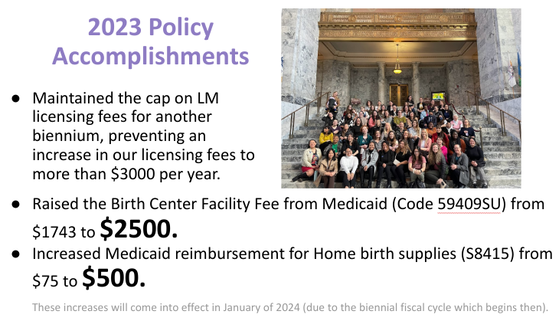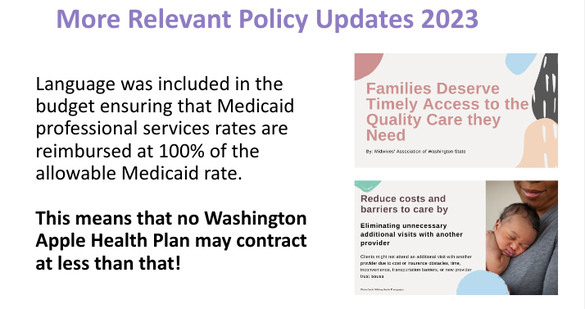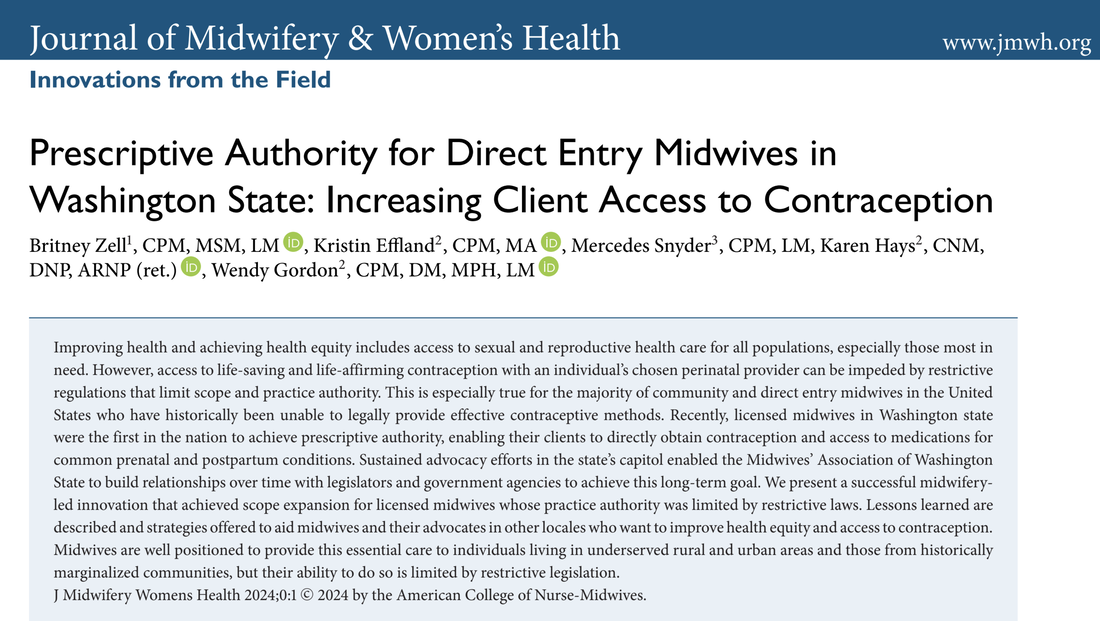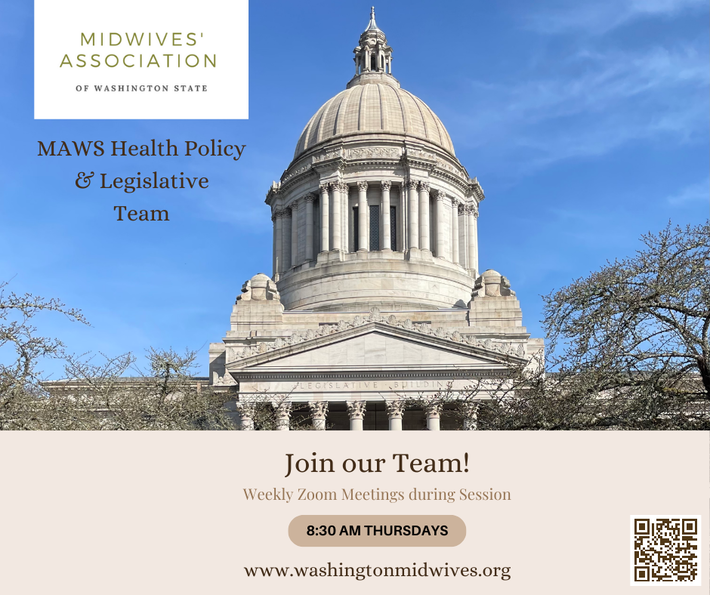For more info on our 2022 Statute update:
2024
For more information about our successes this year & future goals, visit here.
2023
For more about our work & successes this year, check out the Slides presented by the Legislative & Health Policy Team at the 2023 Annual General Member Meeting.
2022
Check out the Slides presented by the Legislative & Health Policy Team at the Annual General Member Meeting or visit this page which contains information about the Bill we passed and our 2022 Legislative Agenda. For the Talking Points we gave our members to aid in their advocacy, click here.
2021
Read our full Legislative & Lobby Day report here or check out the Slides presented by the Legislative & Health Policy Team at the Annual General Member Meeting. The MAWS Legislative Committee had a highly successful and active legislative session in 2021. Our virtual Lobby Day event was the most attended in recent history, with over 150 participants. In a big win, the cap on the LM licensing fee has made it into the House, Senate and Governor’s budget as a $150K line item, ensuring the sustainability of the midwifery program and the continued cap on LM licensing fees. All other bills that MAWS supported this year have also passed:
- SB 5068: Extends Medicaid coverage for pregnant and postpartum people from 60 days post-pregnancy to one year, post-pregnancy, specifically for groups that have not qualified for the Medicaid expansion (i.e. that are only eligible for Medicaid because of pregnancy)
- HB 1031/SB 5072: Certificate of “birth resulting in stillbirth” provides validation and acknowledgment of the family’s experience by symbolizing to bereaved parents that their baby is being acknowledged as a real birth and not just a fetal death
- SB 5140: Protecting pregnancy and miscarriage-related patient care
2020
- Read our full Legislative & Lobby Day report here or check out the Slides presented by the Legislative & Health Policy Team at the Annual General Member Meeting
- Video of 2020 Legislative Agenda
- Link for slides to 2020 leg agenda: https://www.canva.com/design/DADyUh8z5cM/P7Xd4o60hQ0YINz2mk9kfQ/view?utm_content=DADyUh8z5cM&utm_campaign=designshare&utm_medium=link&utm_source=sharebutton
- "A Midwife In North Country" New Yorker article
- Birth Settings in America (a brand new National Academies report that features the work of a local LM, Dr. Wendy Gordon, one of only two non-nurse midwives on the Congressional commission...and this was commissioned by local Rep. Herrera-Butler!)
- "Doulas and Midwives are the Key to Reproductive Justice": https://www.kzoo.edu/praxis/doulas/?fbclid=IwAR0dUSLDdlUiFusi8Vws1n1u-mbGo9XFeRGgtz-G3EknLPQRvewDTihNPmM
- "Let's Midwife the System": https://medium.com/apparently/lets-midwife-the-system-24e47ffbc331
2019
Lobby Day 2019 was a success even in the unprecedented snow storm!
Read our full report here
2018
Lobby Day 2018 was January 18th, and it was very successful! We had a record number of attendees, great response from many legislators, and even a standing ovation. We hope you'll join us in 2019!
Read our full report here
2018 Legislative Agenda
2017
Lobby Day 2017 was a success!
Click here to read about MAWS' successes in the 2017 legislative session.
2017 Lobby Day Report
2016
Over 75 midwives, consumers, students and apprentices traveled down to Olympia for Midwife Lobby Day 2016!
2016 Lobby Day Report
2015
2015 Lobby Day Report
2014
2014 Lobby Day Report
HB 1773 passed on March 7, 2014! Watch Video >
HB 1773 - Bill Highlights
Thank you to everyone for your communications with your WA representatives! It made a difference! Lobby Day held last year on Valentine's Day was a big part of this two year success story!
Click here for a legislative report on last year's work regarding HB 1773.
Spread the word to other midwives and supporters that Lobby Day is not intimidating at all.
Never been? Here's what Lobby Day looked like in 2014: Everyone travels in teams so no one has to speak up if they don’t want to, but the representatives take note of who visits from their districts and they are more likely to vote favorably if they meet you, their constituents face to face.
Trust those of us who come back year after year – it’s worth the trip! And we gain energy and momentum when more members show up! Those who can't make it can still participate by making sure they are signed up for our electronic news alerts and stay tuned for how to contact their legislators to let them know to vote for midwives and families!
As a thank you for coming to Olympia and making your voice heard, we held a post-Lobby Day celebration dinner at the home of MAWS board member, Audrey Levine. There was wine and lots of great food!
This year, we educated legislators about Licensed Midwifery care, and more specifically about our bill that will strengthen our profession through new licensing requirements, create a CPM to LM bridge, clarify scope of practice for newborn care, and finally put the final piece in place to allow Licensed Midwives to delegate duties to nurses.
The work we do is capturing the attention of legislators and policy makers at both the state and the national level because (as you know) midwifery care, home birth and birth center birth are SAFE and COST-EFFECTIVE options for childbearing families. We have an important role to play in transforming maternity care in this country so we hope to see you there next year!
At 8 am on Lobby Day, we gathered at the home of our lobbyist, Amber Ulvenes. There was bagels and coffee/tea while we got oriented to the day’s agenda and picked up our legislative packets. This location served as a base for the day. We walked from there with our teams for our visits with legislators.
2013
2013 Legislative Report
Agenda Item: Support companion bills SB 5626 (Kline)/HB 1773 (Morrell) to enact several important advancements for midwifery care.
Result: Of the two, HB 1773 was the bill to advance, but after a long road it died on the Senate Floor Calendar.
While still in the House, the newborn care provision had been stripped during negotiations and was replaced by a Sunrise Review process at the Department of Health. Fortunately, even though the bill died, the DOH is still moving forward with the Sunrise Review of newborn care at the request of Rep. Eileen Cody.
The DOH has also stated that they plan to do rulemaking on the CPM-LM bridge absent the bill. We will be back in 2014 with another bill both as a backstop and to make further advancements. Our original bill sought to make the following changes:
- It is standard practice and is elsewhere referred to in statute that a midwife provides care to both a mother and baby at birth, but that reference is lacking in the portion of law that refers to compensation. These bills correct a problem that resulted in a midwife not being paid for newborn care by a health insurer. Paying for this care is the norm for insurers and Medicaid today.
- Some midwives have had applications for licensure at the Department of Health (DOH) for up to two years because there is no clear path from the national credential (CPM) to the more rigorous state credential (LM). These bills require the DOH to write rules to develop that bridge and provide clear expectations for applicants. This is a simple change that will build capacity in the midwifery profession and address a critical shortage of maternity care providers in our state.
- Midwifery care is highest quality care, and we want to prove it! The bills create the following requirements for licensure:
- 30 hours of continuing education every three years.
- Mandatory peer review for quality assurance.
- Submission of perinatal outcome data to a research organization (such as MANAstats.)
Result: The licensing fee cap will continue for the 2013-2015 biennium. Annual licensing fees will remain at $525.
We successfully argued that maintaining this cap is an access to care issue because without it licensing fees are projected by the DOH to be $1100 annually, which would force some midwives out of their profession. The demand for home and birth center births is increasing dramatically. Licensed Midwifery is also a profession that the state wants to promote and build because clients receive high-quality care while saving the state money ($3.1 million/biennium; calculated using a 2007 independent study commissioned by the legislature and data from the Department of Social and Health Services First Steps Database.)
Your participation in Lobby Day DOES make a difference!
As a thank you for coming to Olympia and making your voice heard, we are holding a post-Lobby Day celebration dinner at the home of Board Member, Audrey Levine. There'll be wine and lots of great food!
This year, we will be sharing with WA State lawmakers the compelling case for increased access to our services amongst low-risk women on Medicaid and explaining to them the importance of keeping our licensing fee reasonable so we can continue to grow our profession.
The work we do is capturing the attention of legislators and policy makers at both the state and the national level because midwifery care, home birth and birth center birth are safe and cost-effective options for childbearing families.
We have an important role to play in transforming maternity care in this country so we hope to see you there!
2012
2012 Legislative Session Final Report
Agenda Item: Support HB 2186 - Help Licensed Midwives Collaborate with Nurses
Result: HB 2186, sponsored by Rep. Barbara Bailey from Whidbey Island, was signed into law by the Governor. This bill allows Licensed Midwives to give direction to Registered Nurses (RNs) and Licensed Practical Nurses (LPNs). The Department of Health received $11,000 in their budget to undergo rulemaking in 2012 to implement the new law. The department plans to hold two public hearings as part of this process. Our goals with this bill were threefold:
- It removes a barrier for midwives who have hospital privileges or are seeking hospital privileges. A midwife would be able to follow her client into the hospital in the event of a transport, increasing the likelihood of a vaginal birth which carries fewer risks for mother and baby, and is much less costly than a cesarean section.
- It allows nurses to work in freestanding birth centers, or to work as a birth assistant with a Licensed Midwife at home births. Midwives frequently get applications from nurses, but are not able to hire them.
- It removes one barrier to Licensed Midwives working in Federally Qualified Health Centers.This has been identified as one way to address the problem of access to maternity care in rural and underserved areas of the state.
Agenda Item: Maintain the current cap on midwifery licensing fees
Result: The $59,000 budget proviso to cap midwifery licensing fees in 2012 was preserved in the 2012 Supplemental Budget. Annual professional licensing fees are currently capped at $525. Maintaining this cap is an access to care issue because without it licensing fees would be approximately $1500, which would force some midwives out of their profession and discourage some from entering. Licensed Midwifery is a profession that the state wants to promote and build because patients receive high-quality care while saving the state money.
2011
2011 Legislative Session Final Report
From the 2011 MAWS Legislative Agenda, our goals were:
Control exorbitant midwifery licensing fees
Result: The licensing fee cap will continue for the 2011-2013 biennium. We secured a $115,000 budget proviso to hold fees to a total of $525 per year ($500 for licensing, plus $25 for HEAL-WA access.) This was less than the $160,000 that we were seeking, which means the licensed midwife regulatory account at the Department of Health could be in the red next year. We will revisit this issue during the 2012 session.
Give midwives access to HEAL-WA: Support HB 1176/SB 5071
Result: Through the success of SB 5071, sponsored by Sen. Ed Murray, licensed midwives were granted access to HEAL-WA, the UW research resource for health care providers. LMs will have an additional $25 annual fee at licensing or renewal, and should be able to start accessing the service by fall, probably in September. The Department of Health will do rule-making and hold a hearing (because of the fee) during August. HEAL-WA is planning to drop a post card to midwives in October to let them know about their eligibility.
Preserve the Midwifery Advisory Committee: remove from HB 1371/SB 5469
Result: We succeeded in removing The Midwifery Advisory Committee (MAC) at the Department of Health (DOH) from the cut list in the Governor-request bills, HB 1371 and SB 5469. The MAC will continue to meet.
Promote evidence-based maternal & child health: support HB 1311 and HB 1562
Result: The collaborative formed by HB 1311 will research and recommend evidence-based care guidelines, but as signed into law, can choose any topic for review. They are no longer required to first focus on cesarean section rates and early inductions. HB 1562 did not move forward this session, but both House and Senate health care committees plan to discuss current maternity & child health care in our state and develop strategies to reduce preterm births.



